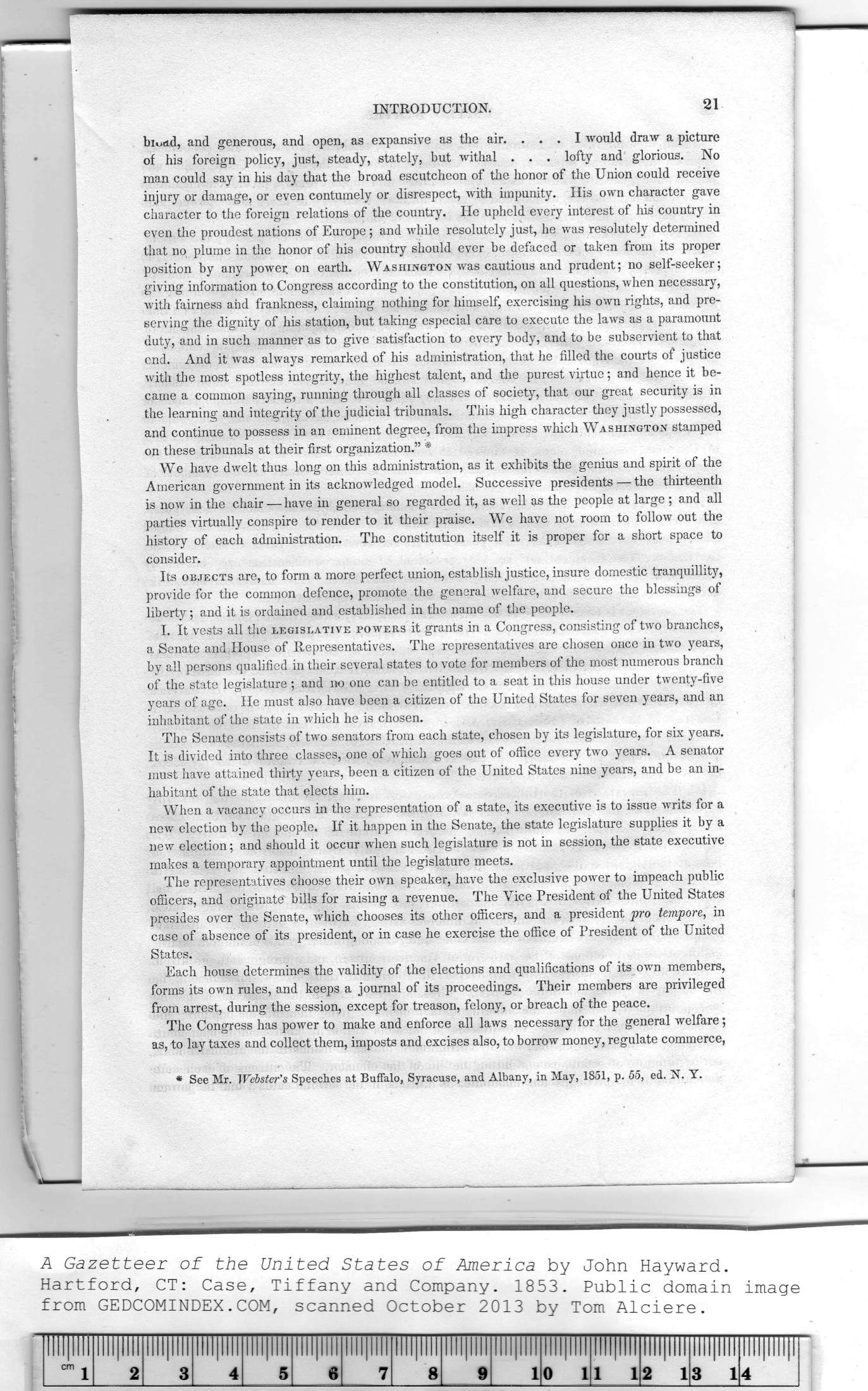|
|
Note: Ctrl and + increases the font size of the text below, Ctrl and - decreases it, and Ctrl and 0 resets it to default size.
INTRODUCTION. 21
biottd, and generous, and open, as expansive as the air. ... I would draw a picture
of his foreign policy, just, steady, stately, but withal ... lofty and glorious. No
man could say in his day that the broad escutcheon of the honor of the Union could receive
injury or damage, or even contumely or disrespect, with impunity. His own character gave
character to the foreign relations of the country. He upheld every interest of his country in
even the proudest nations of Europe; and while resolutely just, he was resolutely determined
that no plume in the honor of his country should ever be defaced or taken from its proper
position by any power, on earth. Washington was cautious and prudent; no self-seeker;
giving information to Congress according to the constitution, on all questions, when necessary,
with fairness and frankness, claiming nothing for himself, exercising his own rights, and pre-
serving tire dignity of his station, but taking especial care to execute the 1 w- as a paramount
duty, and in such manner as to give satisfaction to every body, and to be subservient to that
end. And it was always remarked of his administration, that he filled the ■: rants of justice
with the most spotless integrity, the highest talent, and the purest virtue; and :ence it be-
came a common saying, running through all classes of society, that our great r arity is in
the learning and integrity of the judicial tribunals. This high character they justly pc ssessed,
and continue to possess in an eminent degree, from the impress which Washington stamped
on these tribunals at their first organization." *
We have dwelt thus long on this administration, as it exhibits the genius and spirit of the
American government in its acknowledged model. Successive presidents — the thirteenth
is now in the chair — have in general so regarded it, as well as the people at large ; and all
parties virtually conspire to render to it their praise. We have not room to follow out the
history of each administration. The constitution itself it is proper for a short space to
consider.
Its objects are, to form a more perfect union, establish justice, insure domestic tranquillity,
provide for the common defence, promote the general welfare, and secure the blessings of
liberty; and it is ordained and established in the name of the people.
I. It vests all the legislative powers it grants in a Congress, consisting of two branches,
a Senate and House of Representatives. The representatives are chosen once in two years,
by all persons qualified in their several states to vote for members of the most numerous branch
of the state legislature ; and no one can be entitled to a seat in this house under twenty-five
years of age. He must also have been a citizen of the United States for seven years, and an
inhabitant of the state in which he is chosen.
The Senate consists of two senators from each state, chosen by its legislature, for six years.
It is divided into three classes, one of which goes out of office every two years. A senator
must have attained thirty years, been a citizen of the United States nine years, and be an in-
habitant of the state that elects him.
When a vacancy occurs in the representation of a state, its executive is to issue writs for a
new election by the people. If it happen in the Senate, the state legislature supplies it by a
new election; and should it occur when such legislature is not in session, the state executive
makes a temporary appointment until the legislature meets.
The representatives choose their own speaker, have the exclusive power to impeach public
officers, and originate bills for raising a revenue. The Vice President of the United States
presides over the Senate, which chooses its other officers, and a president pro tempore, in
case of absence of its president, or in case he exercise the office of President of the United
States.
Each house determines the validity of the elections and qualifications of its own members,
forms its own rules, and keeps a journal of its proceedings. Their members are privileged
from arrest, during the session, except for treason, felony, or breach of the peace.
The Congress has power to make and enforce all laws necessary for the general welfare;
as, to lay taxes and collect them, imposts and excises also, to borrow money, regulate commerce,
* See Mr. Webster's Speeches at Buffalo, Syracuse, and Albany, in May, 1851, p. 55, ed. N. Y.
|
lllllllll |
llll|llll |
llll|llll |
lllllllll |
lllllllll |
llll|llll |
llll llll |
lllllllll |
lllllllll |
llll llll |
lllllllll |
lllllllll |
lllllllll |
lllllllll |
|
|
cm j |
2 |
3 |
4 |
5 |
6 |
7 |
8 |
9 |
1 |
0 1 |
1 1 |
2 1 |
3 1 |
4 |
|
